Chemical and Biomolecular Engineering
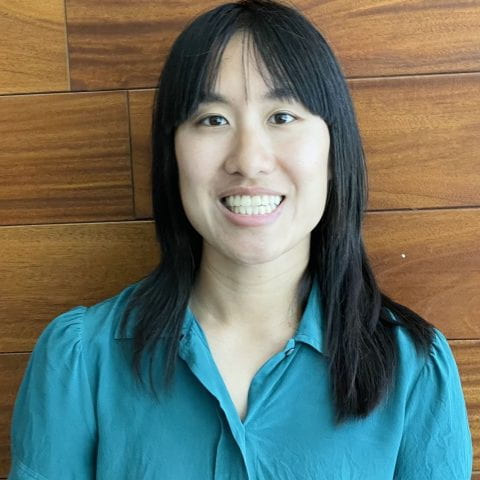 Dr. Angela Chen Dr. Angela Chen is a USDA-NIFA Postdoctoral Fellow in the Jin lab at the University of California, Riverside. Dr. Chen completed undergraduate degrees in chemical engineering and biomedical engineering at The Ohio State University, and her Ph.D. in chemical engineering under the guidance of Dr. Lydia Contreras and Dr. Benjamin Keitz at the University of Texas at Austin as an NSF Graduate Research Fellow. Her doctoral work focused on engineering oxidative stress response mechanisms in extremophilic bacteria for materials science applications, leading to significant insights into how regulatory RNAs can be used to genetically tune nanoparticle properties and functionality. During this time, she also earned a Graduate Certificate in Engineering Education and is passionate about empowering the next generation of scientists and engineers. As a postdoc in Hailing Jin’s lab, she investigates the mechanisms of cross-kingdom RNA trafficking in plant-pathogen interactions and the development and optimization of new nanomaterials for RNAi-based crop protection strategies. In addition, Dr. Chen serves as the President of the Riverside Postdoctoral Association where she leads the planning and execution of initiatives focused on supporting postdocs and creating diverse and inclusive academic environments.
Dr. Angela Chen Dr. Angela Chen is a USDA-NIFA Postdoctoral Fellow in the Jin lab at the University of California, Riverside. Dr. Chen completed undergraduate degrees in chemical engineering and biomedical engineering at The Ohio State University, and her Ph.D. in chemical engineering under the guidance of Dr. Lydia Contreras and Dr. Benjamin Keitz at the University of Texas at Austin as an NSF Graduate Research Fellow. Her doctoral work focused on engineering oxidative stress response mechanisms in extremophilic bacteria for materials science applications, leading to significant insights into how regulatory RNAs can be used to genetically tune nanoparticle properties and functionality. During this time, she also earned a Graduate Certificate in Engineering Education and is passionate about empowering the next generation of scientists and engineers. As a postdoc in Hailing Jin’s lab, she investigates the mechanisms of cross-kingdom RNA trafficking in plant-pathogen interactions and the development and optimization of new nanomaterials for RNAi-based crop protection strategies. In addition, Dr. Chen serves as the President of the Riverside Postdoctoral Association where she leads the planning and execution of initiatives focused on supporting postdocs and creating diverse and inclusive academic environments.
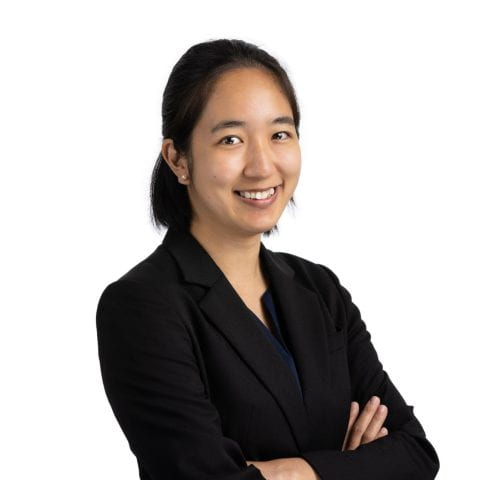 Dr. Natsumi Komatsu is a Schmidt Science Fellow with Prof. Markita Landry at the University of California, Berkeley, where she engineers and utilizes synthetic near-infrared nanosensors to image neurochemical release in acute brain slices. She earned her undergraduate degree in applied physics at Keio University in Japan and completed her PhD in electrical and computer engineering at Rice University under the supervision of Prof. Junichiro Kono, focusing on improving fundamental properties of carbon-based nanomaterials. Integrating her expertise in fundamental nanomaterials science with her postdoctoral research in neurochemical imaging, her lab will develop cutting-edge imaging tools to enhance our understanding of neurochemical activities and aberrations. Her research will pioneer near-infrared optical probes capable of simultaneously imaging multiple analytes. By leveraging the fluorescence tunability of different carbon nanotube chiralities, she seeks to monitor multiple neurochemicals concurrently to gain insights into how neural circuits are affected by the interaction of these compounds and ultimately understand how the chemical dimension of brain circuits modulates animal behavior.
Dr. Natsumi Komatsu is a Schmidt Science Fellow with Prof. Markita Landry at the University of California, Berkeley, where she engineers and utilizes synthetic near-infrared nanosensors to image neurochemical release in acute brain slices. She earned her undergraduate degree in applied physics at Keio University in Japan and completed her PhD in electrical and computer engineering at Rice University under the supervision of Prof. Junichiro Kono, focusing on improving fundamental properties of carbon-based nanomaterials. Integrating her expertise in fundamental nanomaterials science with her postdoctoral research in neurochemical imaging, her lab will develop cutting-edge imaging tools to enhance our understanding of neurochemical activities and aberrations. Her research will pioneer near-infrared optical probes capable of simultaneously imaging multiple analytes. By leveraging the fluorescence tunability of different carbon nanotube chiralities, she seeks to monitor multiple neurochemicals concurrently to gain insights into how neural circuits are affected by the interaction of these compounds and ultimately understand how the chemical dimension of brain circuits modulates animal behavior.
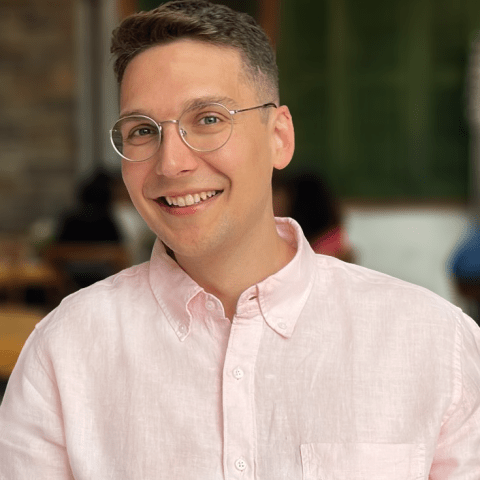 Dr. Alejandro Martinez-Calvois a HFSP/PCTS postdoctoral fellow at the Princeton Center for Theoretical Science. Previously, he completed his graduate studies in fluid mechanics and soft matter under the supervision of Prof. Alejandro Sevilla at Universidad Carlos III de Madrid, Spain, where he focused on the physics of complex fluids and capillary flows. During his time at Princeton, he has pivoted into the fascinating fields of biophysics and quantitative biology, working with Profs. Sujit S. Datta and Ned S. Wingreen. Dr. Martinez-Calvo’s interests span a broad range of research directions, connected by a unifying theme: understanding how living matter self-organizes and functions in three-dimensional complex environments that mimic real-life habitats. Particularly, he is interested in the growth and organization of bacterial colonies in 3D, bacteria-phage interactions, the physics of mammalian 3D hollow structures, and intracellular phase separation. Although theory is his comfort zone, he has had the privilege to explore experimentally some of these research directions. Dr. Martinez-Calvo was born and raised between Madrid and a small town in the Spanish region of Ribera del Duero. Outside research, he loves playing soccer, and enjoy traveling, watching movies, and finding relaxation in music, books, and comics.
Dr. Alejandro Martinez-Calvois a HFSP/PCTS postdoctoral fellow at the Princeton Center for Theoretical Science. Previously, he completed his graduate studies in fluid mechanics and soft matter under the supervision of Prof. Alejandro Sevilla at Universidad Carlos III de Madrid, Spain, where he focused on the physics of complex fluids and capillary flows. During his time at Princeton, he has pivoted into the fascinating fields of biophysics and quantitative biology, working with Profs. Sujit S. Datta and Ned S. Wingreen. Dr. Martinez-Calvo’s interests span a broad range of research directions, connected by a unifying theme: understanding how living matter self-organizes and functions in three-dimensional complex environments that mimic real-life habitats. Particularly, he is interested in the growth and organization of bacterial colonies in 3D, bacteria-phage interactions, the physics of mammalian 3D hollow structures, and intracellular phase separation. Although theory is his comfort zone, he has had the privilege to explore experimentally some of these research directions. Dr. Martinez-Calvo was born and raised between Madrid and a small town in the Spanish region of Ribera del Duero. Outside research, he loves playing soccer, and enjoy traveling, watching movies, and finding relaxation in music, books, and comics.
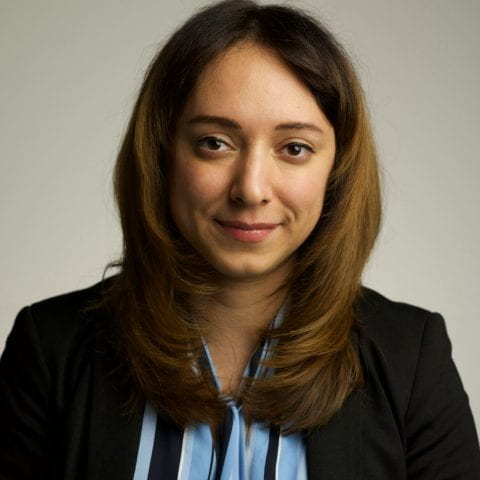 Dr. Sarvenaz Sarabipour is a postdoctoral fellow at the Johns Hopkins Institute for Computational Medicine and Department of Biomedical Engineering, where she primarily works with Dr. Feilim Mac Gabhann.Institute for Computational Medicine & Department of Biomedical Engineering Johns Hopkins University. Biography: is a systems biologist with both experimental and computational expertise, working on developing new therapeutic strategies for vascular disease. Dr. Sarabipour received her B.Sc. in Physics and Mathematics from University of Sydney, Australia and my Ph.D. in Engineering from Whiting School of Engineering at Johns Hopkins University, where she worked on quantifying membrane protein interactions using quantitative fluorescent microscopy. Dr. Sarabipour has a unique background and skillset in multiple quantitative biological disciplines including biophysics, molecular biology, biochemistry and computational systems biology, from single-molecule measurements to multi-scale models of physiology and pathophysiology. She is also experienced in teaching, mentoring and service with a focus on creating, promoting, and enhancing initiatives that increase open scientific communication and improve research and research culture.
Dr. Sarvenaz Sarabipour is a postdoctoral fellow at the Johns Hopkins Institute for Computational Medicine and Department of Biomedical Engineering, where she primarily works with Dr. Feilim Mac Gabhann.Institute for Computational Medicine & Department of Biomedical Engineering Johns Hopkins University. Biography: is a systems biologist with both experimental and computational expertise, working on developing new therapeutic strategies for vascular disease. Dr. Sarabipour received her B.Sc. in Physics and Mathematics from University of Sydney, Australia and my Ph.D. in Engineering from Whiting School of Engineering at Johns Hopkins University, where she worked on quantifying membrane protein interactions using quantitative fluorescent microscopy. Dr. Sarabipour has a unique background and skillset in multiple quantitative biological disciplines including biophysics, molecular biology, biochemistry and computational systems biology, from single-molecule measurements to multi-scale models of physiology and pathophysiology. She is also experienced in teaching, mentoring and service with a focus on creating, promoting, and enhancing initiatives that increase open scientific communication and improve research and research culture.
Information Science
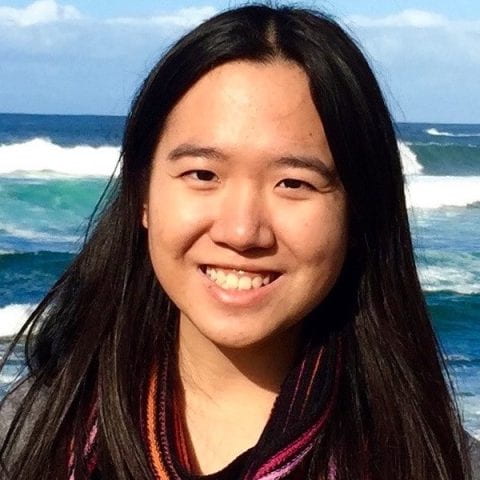 Dr. Serina Chang is a 5th year PhD student in Computer Science at Stanford University, co-advised by Jure Leskovec and Johan Ugander. Previously, she received her B.A. at Columbia University, where she studied Computer Science and Sociology. Serina’s research focuses on large-scale human networks, such as mobility networks, social networks, and query-click graphs from search engines. She develops methods in data science and machine learning to infer robust, real-world signals from network data and leverage these signals to tackle complex policy problems in public health and society. Her recent projects include modeling the spread of COVID-19 over mobility networks, estimating causal spillover effects of pandemic policies, and analyzing the concerns of vaccine holdouts from web search logs. Serina’s work has been published in venues including Nature, PNAS, KDD, AAAI, EMNLP, and ICWSM, and featured in media outlets such as The New York Times and The Washington Post. Her work is also recognized by the KDD 2021 Best Paper Award, Meta PhD Fellowship, NSF Graduate Research Fellowship, and CRA Outstanding Undergraduate Researcher Award. Serina is also passionate about teaching and outreach and has served as head course assistant for Stanford’s Machine Learning with Graphs, a mentor in Stanford’s undergraduate research programs, Program Chair of Machine Learning for Health 2023, and a co-Chair of the Data Science for Social Good Workshop at KDD 2023.
Dr. Serina Chang is a 5th year PhD student in Computer Science at Stanford University, co-advised by Jure Leskovec and Johan Ugander. Previously, she received her B.A. at Columbia University, where she studied Computer Science and Sociology. Serina’s research focuses on large-scale human networks, such as mobility networks, social networks, and query-click graphs from search engines. She develops methods in data science and machine learning to infer robust, real-world signals from network data and leverage these signals to tackle complex policy problems in public health and society. Her recent projects include modeling the spread of COVID-19 over mobility networks, estimating causal spillover effects of pandemic policies, and analyzing the concerns of vaccine holdouts from web search logs. Serina’s work has been published in venues including Nature, PNAS, KDD, AAAI, EMNLP, and ICWSM, and featured in media outlets such as The New York Times and The Washington Post. Her work is also recognized by the KDD 2021 Best Paper Award, Meta PhD Fellowship, NSF Graduate Research Fellowship, and CRA Outstanding Undergraduate Researcher Award. Serina is also passionate about teaching and outreach and has served as head course assistant for Stanford’s Machine Learning with Graphs, a mentor in Stanford’s undergraduate research programs, Program Chair of Machine Learning for Health 2023, and a co-Chair of the Data Science for Social Good Workshop at KDD 2023.
Dr. Kristina Gligoric 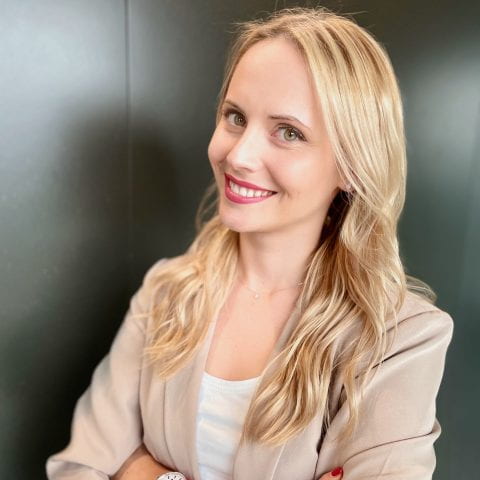 is a Postdoctoral Scholar at Stanford University Computer Science Department, advised by Dan Jurafsky at the NLP group. Previously she obtained her Ph.D. in Computer Science at EPFL, where she was advised by Robert West. Her research focuses on developing principled foundations for computational social science that help solve burning societal issues, understand and improve human well-being, and promote social good. She leverages large-scale textual data and digital behavioral traces and tailors computational methods drawn from AI, NLP, and causal inference. She puts a strong emphasis on understanding and addressing the biases, limitations, and social implications of computational approaches deployed in high-stakes scenarios. Her work has been published in top computer science conferences (such as ACM CSCW, AAAI ICWSM, and TheWebConf) and broad audience journals (Nature Communications and Nature Medicine). She is a Swiss National Science Foundation Fellow. She received awards for her work, including CSCW 2021 Best Paper Honorable Mention Award, ICWSM 2021 and 2023 Best Reviewer Award, and EPFL Best Teaching Assistant Award.
is a Postdoctoral Scholar at Stanford University Computer Science Department, advised by Dan Jurafsky at the NLP group. Previously she obtained her Ph.D. in Computer Science at EPFL, where she was advised by Robert West. Her research focuses on developing principled foundations for computational social science that help solve burning societal issues, understand and improve human well-being, and promote social good. She leverages large-scale textual data and digital behavioral traces and tailors computational methods drawn from AI, NLP, and causal inference. She puts a strong emphasis on understanding and addressing the biases, limitations, and social implications of computational approaches deployed in high-stakes scenarios. Her work has been published in top computer science conferences (such as ACM CSCW, AAAI ICWSM, and TheWebConf) and broad audience journals (Nature Communications and Nature Medicine). She is a Swiss National Science Foundation Fellow. She received awards for her work, including CSCW 2021 Best Paper Honorable Mention Award, ICWSM 2021 and 2023 Best Reviewer Award, and EPFL Best Teaching Assistant Award.
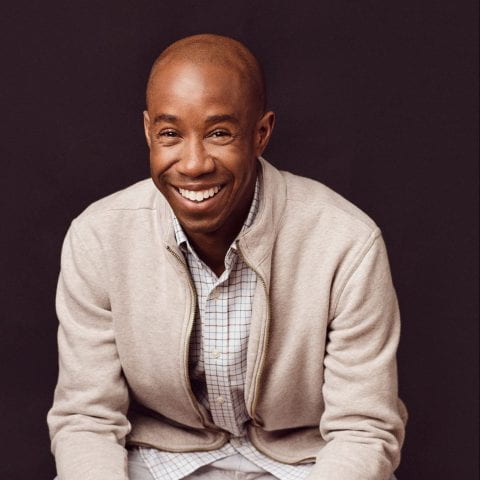 Dr. Carl Haynes-Magyar is a Presidential Postdoctoral Fellow at Carnegie Mellon University’s School of Computer Science in the Human–Computer Interaction Institute. Carl’s master’s work included evaluating curriculums based on their ability to develop a learner’s proficiencies for assessment and assessing the relationship between perceived and actual learning outcomes during web search interaction. Carl’s doctoral work involved studying the design of learning analytics dashboards (LADs) to support learners’ development of self-regulated learning (SRL) skills and investigating how people learn to program using interactive eBooks with adaptive mixed-up code (Parsons) problems. Carl’s postdoctoral work is a continued investigation into computing education that involves creating an online programming practice environment called Codespec. The goal is to scaffold the development of programming skills such as code reading and tracing, code writing, pattern comprehension, and pattern application across a gentle slope of different problem types. These types range from block-based programming problems to writing code from scratch. Codespec will support learners, instructors, and researchers by providing help-seeking features, generating multimodal learning analytics, and cultivating IDEAS+: inclusion, diversity, equity, accessibility, sexual orientation and gender awareness, and justice. Carl has published several peer-reviewed articles at top venues such as the Conference on Human Factors in Computing Systems (CHI). He has taught as an instructor for courses on organizational behavior, cognitive and social psychology, human-computer interaction, learning analytics, educational data science, and data science ethics. He has been nominated for awards related to instruction and diversity, equity, and inclusion. He is a member of AAAI, ACM SIGCHI and SIGCSE, ALISE, and ISLS. Carl received his Ph.D. at the University of Michigan School of information in 2022, and a master’s degree in Library and Information Science with honors from Syracuse University’s School of Information Studies (iSchool) in 2016.
Dr. Carl Haynes-Magyar is a Presidential Postdoctoral Fellow at Carnegie Mellon University’s School of Computer Science in the Human–Computer Interaction Institute. Carl’s master’s work included evaluating curriculums based on their ability to develop a learner’s proficiencies for assessment and assessing the relationship between perceived and actual learning outcomes during web search interaction. Carl’s doctoral work involved studying the design of learning analytics dashboards (LADs) to support learners’ development of self-regulated learning (SRL) skills and investigating how people learn to program using interactive eBooks with adaptive mixed-up code (Parsons) problems. Carl’s postdoctoral work is a continued investigation into computing education that involves creating an online programming practice environment called Codespec. The goal is to scaffold the development of programming skills such as code reading and tracing, code writing, pattern comprehension, and pattern application across a gentle slope of different problem types. These types range from block-based programming problems to writing code from scratch. Codespec will support learners, instructors, and researchers by providing help-seeking features, generating multimodal learning analytics, and cultivating IDEAS+: inclusion, diversity, equity, accessibility, sexual orientation and gender awareness, and justice. Carl has published several peer-reviewed articles at top venues such as the Conference on Human Factors in Computing Systems (CHI). He has taught as an instructor for courses on organizational behavior, cognitive and social psychology, human-computer interaction, learning analytics, educational data science, and data science ethics. He has been nominated for awards related to instruction and diversity, equity, and inclusion. He is a member of AAAI, ACM SIGCHI and SIGCSE, ALISE, and ISLS. Carl received his Ph.D. at the University of Michigan School of information in 2022, and a master’s degree in Library and Information Science with honors from Syracuse University’s School of Information Studies (iSchool) in 2016.
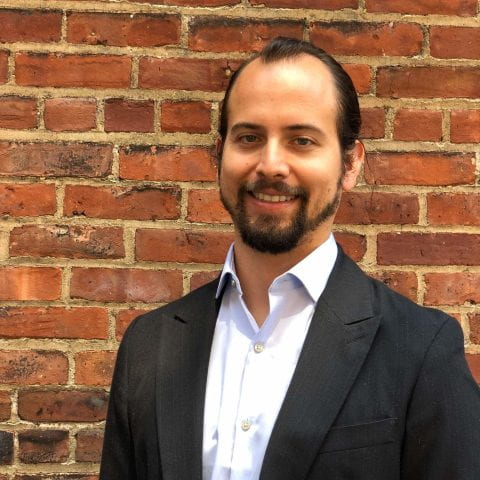 Dr. Ronald Robertson designs experiments and software to study the ways in which humans and algorithms interact in digital spaces, especially as they pertain to information seeking. Currently, he is a postdoctoral fellow at the Stanford Internet Observatory. Before coming to Stanford, Dr. Robertson completed his PhD in Network Science at Northeastern University, and was lucky to be advised by Christo Wilson, a computer scientist, and David Lazer, a political scientist. Dr. Robertson’s research falls under the broad umbrella of computational social science and focuses on the impact of search engines on society. His work on this topic has been published in journals, including Nature, PNAS, and Science Advances, and in conference proceedings, such as the Proceedings of the ACM Conference on Human Factors in Computing Systems (CHI), Proceedings of the ACM: Human-Computer Interaction (CSCW), and the Proceedings of the Web Conference (WWW). Prior to his PhD, Dr. Robertson helped build a nonprofit research institute, and during his PhD I worked with the Fairness, Accountability, Transparency, and Ethics (FATE) team at Microsoft Research New York.
Dr. Ronald Robertson designs experiments and software to study the ways in which humans and algorithms interact in digital spaces, especially as they pertain to information seeking. Currently, he is a postdoctoral fellow at the Stanford Internet Observatory. Before coming to Stanford, Dr. Robertson completed his PhD in Network Science at Northeastern University, and was lucky to be advised by Christo Wilson, a computer scientist, and David Lazer, a political scientist. Dr. Robertson’s research falls under the broad umbrella of computational social science and focuses on the impact of search engines on society. His work on this topic has been published in journals, including Nature, PNAS, and Science Advances, and in conference proceedings, such as the Proceedings of the ACM Conference on Human Factors in Computing Systems (CHI), Proceedings of the ACM: Human-Computer Interaction (CSCW), and the Proceedings of the Web Conference (WWW). Prior to his PhD, Dr. Robertson helped build a nonprofit research institute, and during his PhD I worked with the Fairness, Accountability, Transparency, and Ethics (FATE) team at Microsoft Research New York.
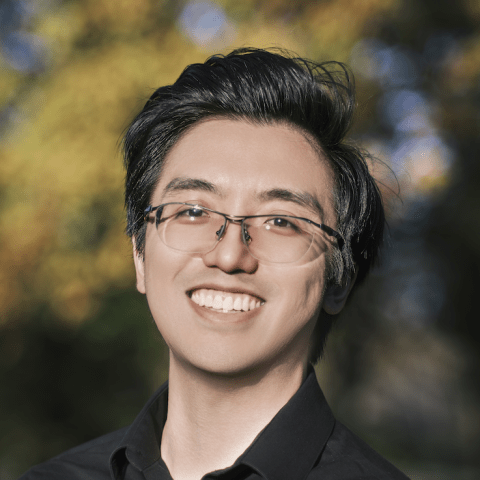 Dr. Xuhai Xu “Orson” Xu is currently a postdoctoral researcher in the MIT Electrical Engineering and Computer Science Department. Xuhai received his B.A. in Industry Engineering from Tsinghua University, and his Ph.D. in the Information School from the University of Washington. His research straddles multiple disciplines, including human-computer interaction, ubiquitous computing, machine learning, and health. Intrigued by the potential of harnessing everyday device data, Xuhai seeks to better understand, model, and influence human behavior, particularly for long-term health and well-being. His approach is two-fold: On the one hand, he develops novel and deployable machine learning algorithms to model human behavior to predict health and well-being outcomes. On the other hand, utilizing these behavior models, he designs new human-AI interaction techniques that benefit domain experts and end-users. He also develops and deploys behavior change intervention methods for well-being promotion. Xuhai’s long-term vision involves establishing a computational ecosystem for longitudinal health and well-being, serving a wide array of stakeholders, including clinicians, patients, and the general public. Xuhai’s work has been recognized by several awards, including 8 Best Paper, Best Paper Honorable Mention, and Best Artifact awards. His research has been covered by media outlets such as The Washington Post, ACM News, and UW News. He earned the Gaetano Borriello Outstanding Student Award Winner at ACM UbiComp 2022.
Dr. Xuhai Xu “Orson” Xu is currently a postdoctoral researcher in the MIT Electrical Engineering and Computer Science Department. Xuhai received his B.A. in Industry Engineering from Tsinghua University, and his Ph.D. in the Information School from the University of Washington. His research straddles multiple disciplines, including human-computer interaction, ubiquitous computing, machine learning, and health. Intrigued by the potential of harnessing everyday device data, Xuhai seeks to better understand, model, and influence human behavior, particularly for long-term health and well-being. His approach is two-fold: On the one hand, he develops novel and deployable machine learning algorithms to model human behavior to predict health and well-being outcomes. On the other hand, utilizing these behavior models, he designs new human-AI interaction techniques that benefit domain experts and end-users. He also develops and deploys behavior change intervention methods for well-being promotion. Xuhai’s long-term vision involves establishing a computational ecosystem for longitudinal health and well-being, serving a wide array of stakeholders, including clinicians, patients, and the general public. Xuhai’s work has been recognized by several awards, including 8 Best Paper, Best Paper Honorable Mention, and Best Artifact awards. His research has been covered by media outlets such as The Washington Post, ACM News, and UW News. He earned the Gaetano Borriello Outstanding Student Award Winner at ACM UbiComp 2022.
Microbiology
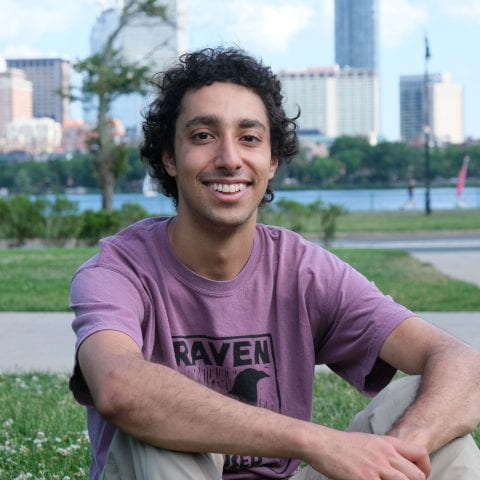 Dr. Pablo Cardenas Ramirez, creates experimental and computational tools to study infectious diseases across scales, from the molecular to the epidemiological. His Ph.D. work at the MIT Department of Biological Engineering has focused on engineering synthetic biology systems used to control gene expression in malaria parasites, responsible for half a million deaths in some of the world’s poorest communities. In addition, Pablo develops approaches to simulate the spread and evolution of infectious diseases. He applies these to study malaria, COVID-19, and dengue in collaboration with researchers and public health workers in the US, Germany, Mali, and his native Colombia. He looks forward to combining synthetic biology tools and computational simulation to create models of pathogen evolution able to advance fundamental biology as well as inform decision making in public health policy and pharmaceutical design. Finally, Pablo firmly believes in the value of dedicated practices in science education. At MIT, he has helped foster student-oriented, inclusive training environments through his roles as a confidential peer conflict counselor with the MIT REFS, a programming tutor and fellow of the Biological Engineering Data Lab, and a Teaching Development Fellow with MIT’s Teaching and Learning Laboratory. Pablo has taught at both MIT and Universidad de los Andes, his undergraduate alma mater, as a teaching assistant and guest lecturer. He looks forward to continuing to train future generations of scientists.
Dr. Pablo Cardenas Ramirez, creates experimental and computational tools to study infectious diseases across scales, from the molecular to the epidemiological. His Ph.D. work at the MIT Department of Biological Engineering has focused on engineering synthetic biology systems used to control gene expression in malaria parasites, responsible for half a million deaths in some of the world’s poorest communities. In addition, Pablo develops approaches to simulate the spread and evolution of infectious diseases. He applies these to study malaria, COVID-19, and dengue in collaboration with researchers and public health workers in the US, Germany, Mali, and his native Colombia. He looks forward to combining synthetic biology tools and computational simulation to create models of pathogen evolution able to advance fundamental biology as well as inform decision making in public health policy and pharmaceutical design. Finally, Pablo firmly believes in the value of dedicated practices in science education. At MIT, he has helped foster student-oriented, inclusive training environments through his roles as a confidential peer conflict counselor with the MIT REFS, a programming tutor and fellow of the Biological Engineering Data Lab, and a Teaching Development Fellow with MIT’s Teaching and Learning Laboratory. Pablo has taught at both MIT and Universidad de los Andes, his undergraduate alma mater, as a teaching assistant and guest lecturer. He looks forward to continuing to train future generations of scientists.
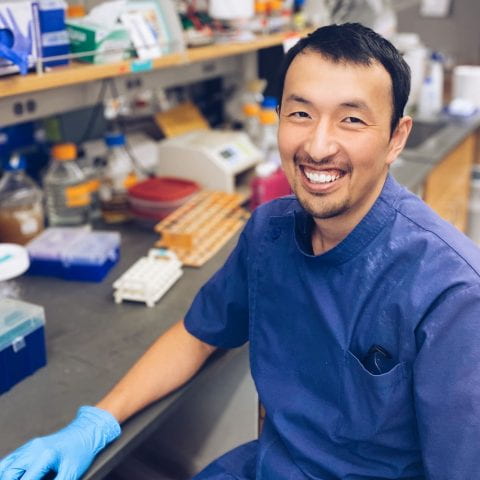 Dr. Takehiro Kado,is a dedicated and accomplished 5th-year postdoctoral researcher at the University of Massachusetts Amherst. During his time as a graduate student at Veterinary Medical School of Kitasato University in Japan, Hiro focused on studying <i>Vibrio vulnificus</i>, a sepsis-causing bacterium, and its immune evading mechanisms. Currently, Hiro’s primary research interest lies in investigating the cell envelope dynamics of mycobacteria. With a profound interest in an academic/faculty career, Hiro is driven by the desire to contribute to scientific knowledge, mentor first-generation students, and create a lasting impact in the field of microbiology. Eager to pursue this aspiration, Hiro is excited to participate in the Cornell Future Faculty Symposium, viewing it as a significant step towards achieving these goals. Grateful to the organizing committee for extending this opportunity, Hiro looks forward to engaging with like-minded scholars and experts to further enhance his academic journey and make meaningful contributions to the scientific community.
Dr. Takehiro Kado,is a dedicated and accomplished 5th-year postdoctoral researcher at the University of Massachusetts Amherst. During his time as a graduate student at Veterinary Medical School of Kitasato University in Japan, Hiro focused on studying <i>Vibrio vulnificus</i>, a sepsis-causing bacterium, and its immune evading mechanisms. Currently, Hiro’s primary research interest lies in investigating the cell envelope dynamics of mycobacteria. With a profound interest in an academic/faculty career, Hiro is driven by the desire to contribute to scientific knowledge, mentor first-generation students, and create a lasting impact in the field of microbiology. Eager to pursue this aspiration, Hiro is excited to participate in the Cornell Future Faculty Symposium, viewing it as a significant step towards achieving these goals. Grateful to the organizing committee for extending this opportunity, Hiro looks forward to engaging with like-minded scholars and experts to further enhance his academic journey and make meaningful contributions to the scientific community.
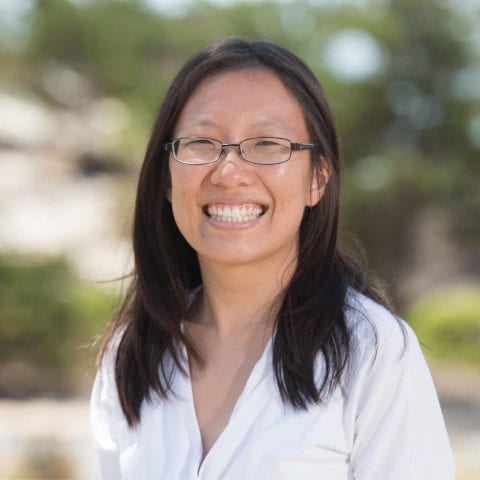 Dr. Katherine Xue, is a microbial ecologist and evolutionary biologist studying colonization in the human gut microbiome. As a PhD student at the University of Washington in Jesse Bloom’s lab, Katherine studied influenza evolution. She showed that distinct influenza variants can cooperate in cell culture, and she also demonstrated that influenza viruses can evolve in chronic infections in ways that mimic the virus’s global evolution. Now, as a postdoctoral fellow at Stanford University in the labs of David Relman and Dmitri Petrov, Katherine is investigating the ecological forces and molecular mechanisms that affect colonization in the gut microbiome. She is studying the dynamics of colonization after antibiotic perturbations, and she has built a platform of in vitro gut microbial communities to investigate the microbial interactions that affect colonization. Her future lab will combine observational studies of the human gut microbiome with experimental studies of gut-derived microbial communities to investigate the ecological determinants of colonization. Katherine is also passionate about science communication, and she has written about science for The New Yorker, Harvard Magazine, and The Conversation.
Dr. Katherine Xue, is a microbial ecologist and evolutionary biologist studying colonization in the human gut microbiome. As a PhD student at the University of Washington in Jesse Bloom’s lab, Katherine studied influenza evolution. She showed that distinct influenza variants can cooperate in cell culture, and she also demonstrated that influenza viruses can evolve in chronic infections in ways that mimic the virus’s global evolution. Now, as a postdoctoral fellow at Stanford University in the labs of David Relman and Dmitri Petrov, Katherine is investigating the ecological forces and molecular mechanisms that affect colonization in the gut microbiome. She is studying the dynamics of colonization after antibiotic perturbations, and she has built a platform of in vitro gut microbial communities to investigate the microbial interactions that affect colonization. Her future lab will combine observational studies of the human gut microbiome with experimental studies of gut-derived microbial communities to investigate the ecological determinants of colonization. Katherine is also passionate about science communication, and she has written about science for The New Yorker, Harvard Magazine, and The Conversation.
Microbiology & Immunology
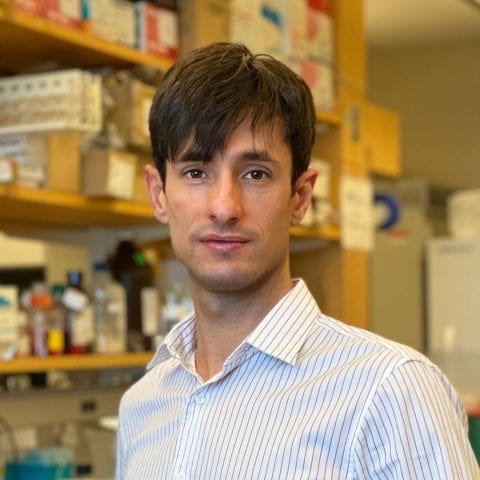 Dr. Antonio Ferreira is a Postdoctoral research fellow at Brigham and Women’s Hospital at Harvard Medical School. His present work is focused on the stromal microenvironment of B cell lymphomas. Dr. Ferreira has multidisciplinary research expertise that derives from having changed research fields from his PhD to his Postdoc. During his PhD at University College London, he worked on biochemistry and cell biology topics including membrane receptor endocytosis, cell signaling and cell migration. During Dr. Ferreira’s Postdoc, he developed expertise in human sample processing for the study of the tumor microenvironment. Additionally, he has acquired skills in bioinformatics, an essential aspect of his current research. Dr, Ferreira’s overall research interests include membrane receptor-mediated communication between cancer cells and the cells in the cancer microenvironment, that oftentimes sustain cancer malignant proliferation. He is driven by a long-term goal to establish himself as a global leader in the study of cancer microenvironment and immune-associated disorders. His passion is not limited to research alone; he also finds great joy in mentoring and training young scientists from diverse backgrounds, helping to nurture the next generation of scientists. Outside the lab he loves to practice sports such as soccer, running, swimming and table tennis.
Dr. Antonio Ferreira is a Postdoctoral research fellow at Brigham and Women’s Hospital at Harvard Medical School. His present work is focused on the stromal microenvironment of B cell lymphomas. Dr. Ferreira has multidisciplinary research expertise that derives from having changed research fields from his PhD to his Postdoc. During his PhD at University College London, he worked on biochemistry and cell biology topics including membrane receptor endocytosis, cell signaling and cell migration. During Dr. Ferreira’s Postdoc, he developed expertise in human sample processing for the study of the tumor microenvironment. Additionally, he has acquired skills in bioinformatics, an essential aspect of his current research. Dr, Ferreira’s overall research interests include membrane receptor-mediated communication between cancer cells and the cells in the cancer microenvironment, that oftentimes sustain cancer malignant proliferation. He is driven by a long-term goal to establish himself as a global leader in the study of cancer microenvironment and immune-associated disorders. His passion is not limited to research alone; he also finds great joy in mentoring and training young scientists from diverse backgrounds, helping to nurture the next generation of scientists. Outside the lab he loves to practice sports such as soccer, running, swimming and table tennis.
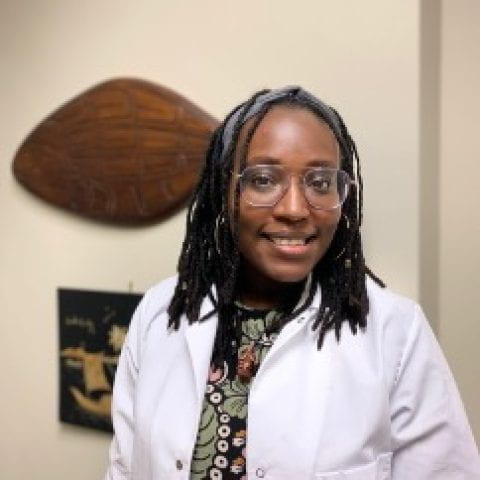 Dr. Ayana Ruffin was born and raised in Prince Georges County MD, in a small town outside of the Washington DC area. She is the youngest of five siblings and the first in her family to graduate college and pursue professional school. Dr. Ruffin received her bachelor’s and master’s degree in Cellular and Molecular Biology from Towson University in Towson, MD. She previously worked in the laboratory of Dr. Elana Ehrlich studying the how Kaposi’s sarcoma associated herpesvirus causes a skin cancer know as Kaposi’s sarcoma. Dr. Ruffin completed her doctoral degree at the University of Pittsburgh in the laboratory of Dr. Tullia Bruno studying B cell immune responses to head and neck cancer. She is now a postdoctoral research fellow studying adoptive cellular therapy with Dr. Chrystal Paulos at Emory University. Dr. Ruffin’s overall career goals are to start her own research laboratory studying immune responses to virus-associated cancers. When she am not in lab, she enjoys traveling, reading books, and listening to music. She is a self-taught artist and likes to draw and paint in her free time!
Dr. Ayana Ruffin was born and raised in Prince Georges County MD, in a small town outside of the Washington DC area. She is the youngest of five siblings and the first in her family to graduate college and pursue professional school. Dr. Ruffin received her bachelor’s and master’s degree in Cellular and Molecular Biology from Towson University in Towson, MD. She previously worked in the laboratory of Dr. Elana Ehrlich studying the how Kaposi’s sarcoma associated herpesvirus causes a skin cancer know as Kaposi’s sarcoma. Dr. Ruffin completed her doctoral degree at the University of Pittsburgh in the laboratory of Dr. Tullia Bruno studying B cell immune responses to head and neck cancer. She is now a postdoctoral research fellow studying adoptive cellular therapy with Dr. Chrystal Paulos at Emory University. Dr. Ruffin’s overall career goals are to start her own research laboratory studying immune responses to virus-associated cancers. When she am not in lab, she enjoys traveling, reading books, and listening to music. She is a self-taught artist and likes to draw and paint in her free time!
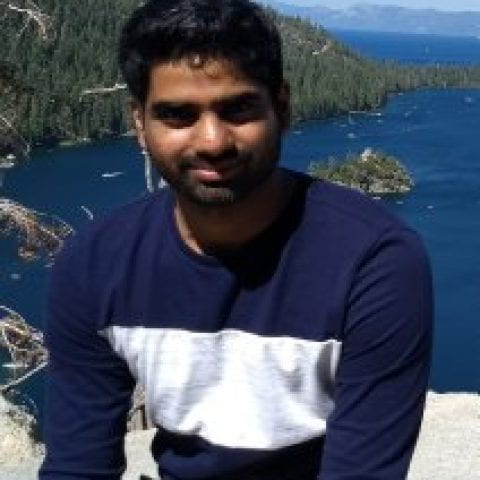 Dr. Palash Sashittal is a Postdoctoral Research Associate with Prof. Ben Raphael in the Computer Science Department at Princeton University. His research focuses on the design of combinatorial and statistical algorithms to analyze and interpret sequencing data. Recent areas of emphasis include infectious disease evolution and transmission, cancer genome evolution, and cell fate mapping in developmental systems. He received a Ph.D. in Aerospace Engineering and M.S. in Computer Science from University of Illinois Urbana-Champaign (UIUC), and B.Tech. in Aerospace Engineering from Indian Institute of Technology Bombay (IIT Bombay). Palash’s work has been recognized by multiple awards and honors, including Best Paper Award at RECOMB CCB, Mavis Future Faculty Fellowship (UIUC), and Center for Turbulence Research Summer Program Fellowship (Stanford). Palash is firmly committed to enhancing diversity, equity, and inclusion in STEM through mentoring, outreach, and service activities. Apart from research, he enjoys rock climbing.
Dr. Palash Sashittal is a Postdoctoral Research Associate with Prof. Ben Raphael in the Computer Science Department at Princeton University. His research focuses on the design of combinatorial and statistical algorithms to analyze and interpret sequencing data. Recent areas of emphasis include infectious disease evolution and transmission, cancer genome evolution, and cell fate mapping in developmental systems. He received a Ph.D. in Aerospace Engineering and M.S. in Computer Science from University of Illinois Urbana-Champaign (UIUC), and B.Tech. in Aerospace Engineering from Indian Institute of Technology Bombay (IIT Bombay). Palash’s work has been recognized by multiple awards and honors, including Best Paper Award at RECOMB CCB, Mavis Future Faculty Fellowship (UIUC), and Center for Turbulence Research Summer Program Fellowship (Stanford). Palash is firmly committed to enhancing diversity, equity, and inclusion in STEM through mentoring, outreach, and service activities. Apart from research, he enjoys rock climbing.
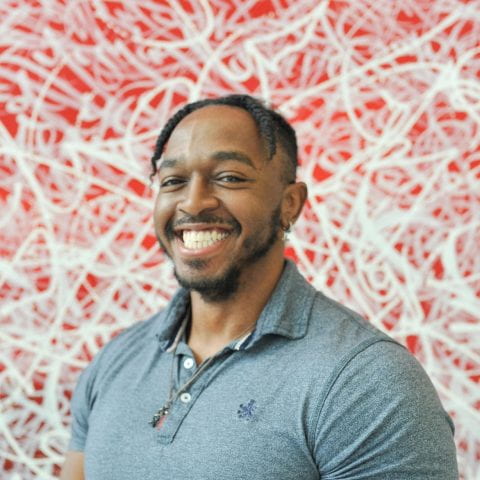 Dr. Dominique Stephens, is currently a third-year postdoctoral fellow with a joint appointment at Fisk and Vanderbilt University. His research area specialties are cell and cancer biology and microscopy. The goal of Dr. Stephen’s research program is to use key immunostimulatory biomolecules to modulate the antitumor response in order to create novel immunotherapies. Dr. Stephens received his BS in chemistry from Butler University, MS in biophysical chemistry from Georgia State University, and PhD in biochemistry from Howard University. Dr. Stephens passionate about conducting research and moving the scientific community forward because he believes that scientific research can help us understand and solve the world’s ailments.
Dr. Dominique Stephens, is currently a third-year postdoctoral fellow with a joint appointment at Fisk and Vanderbilt University. His research area specialties are cell and cancer biology and microscopy. The goal of Dr. Stephen’s research program is to use key immunostimulatory biomolecules to modulate the antitumor response in order to create novel immunotherapies. Dr. Stephens received his BS in chemistry from Butler University, MS in biophysical chemistry from Georgia State University, and PhD in biochemistry from Howard University. Dr. Stephens passionate about conducting research and moving the scientific community forward because he believes that scientific research can help us understand and solve the world’s ailments.
Molecular Biology & Genetics
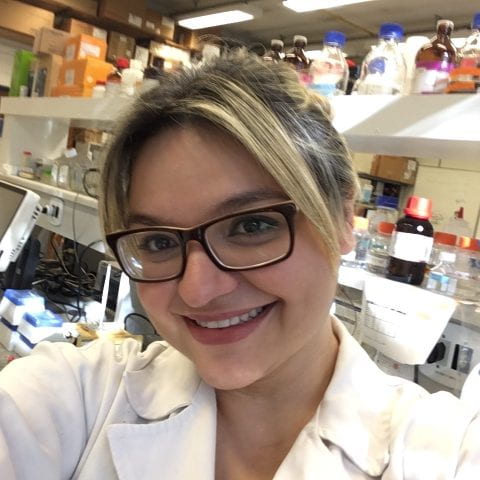 Dr. Maria Fernanda Forni is a cell and molecular biologist and a Pew Postdoctoral Fellow at the Molecular, Cellular, and Developmental Biology Department in the Horsley Lab at Yale University. Her overarching goal is to understand how metabolism regulates cell fate and function. For that, she uses the skin as a model to investigate how stem and immune cells are regulated by energetic substrate availability and how metabolic changes regulate cell fate. She earned her BSc in Biology from the University of São Paulo and her Ph.D. in Biochemistry and Molecular Biology from the University of São Paulo with a period at the Stem Cell Center of Cambridge University, UK. As an independent scientist, I will focus on understanding the molecular mechanisms involved in the metabolic control of the immune and stem cell fate and function and how they collectively coordinate tissue homeostasis in mammalian skin. Her research program is focused on characterizing the unique metabolic landscapes displayed by stem and immune cells and how those change upon commitment to differentiation. Another interest is to unveil how environmental shifts in the availability of energetic substrates impact the self-renew, homeostasis, and long-term maintenance of these cells. A core motivation driving this work is the search for metabolic signatures associated with normal homeostasis and how these become derailed during aging and disease. This can lead to future therapies to tackle aging itself and age-associated diseases such as overt inflammation and cancer. In pursuit of this goal, her research focuses on three complementary themes which aim to: (1) characterize the metabolic landscape and its contribution to the developmental morphogenesis of skin, (2) understand the metabolic profiles displayed during normal homeostasis and regeneration, and (3) what is the impact of metabolic changes during disrupted homeostasis such as aging, inflammation, and cancer. In summary, my research program will unveil very basic aspects of the metabolic control of mammalian cell fate and function and will pave the way for developing strategies to promote healthy aging and prevent age-related diseases.
Dr. Maria Fernanda Forni is a cell and molecular biologist and a Pew Postdoctoral Fellow at the Molecular, Cellular, and Developmental Biology Department in the Horsley Lab at Yale University. Her overarching goal is to understand how metabolism regulates cell fate and function. For that, she uses the skin as a model to investigate how stem and immune cells are regulated by energetic substrate availability and how metabolic changes regulate cell fate. She earned her BSc in Biology from the University of São Paulo and her Ph.D. in Biochemistry and Molecular Biology from the University of São Paulo with a period at the Stem Cell Center of Cambridge University, UK. As an independent scientist, I will focus on understanding the molecular mechanisms involved in the metabolic control of the immune and stem cell fate and function and how they collectively coordinate tissue homeostasis in mammalian skin. Her research program is focused on characterizing the unique metabolic landscapes displayed by stem and immune cells and how those change upon commitment to differentiation. Another interest is to unveil how environmental shifts in the availability of energetic substrates impact the self-renew, homeostasis, and long-term maintenance of these cells. A core motivation driving this work is the search for metabolic signatures associated with normal homeostasis and how these become derailed during aging and disease. This can lead to future therapies to tackle aging itself and age-associated diseases such as overt inflammation and cancer. In pursuit of this goal, her research focuses on three complementary themes which aim to: (1) characterize the metabolic landscape and its contribution to the developmental morphogenesis of skin, (2) understand the metabolic profiles displayed during normal homeostasis and regeneration, and (3) what is the impact of metabolic changes during disrupted homeostasis such as aging, inflammation, and cancer. In summary, my research program will unveil very basic aspects of the metabolic control of mammalian cell fate and function and will pave the way for developing strategies to promote healthy aging and prevent age-related diseases.
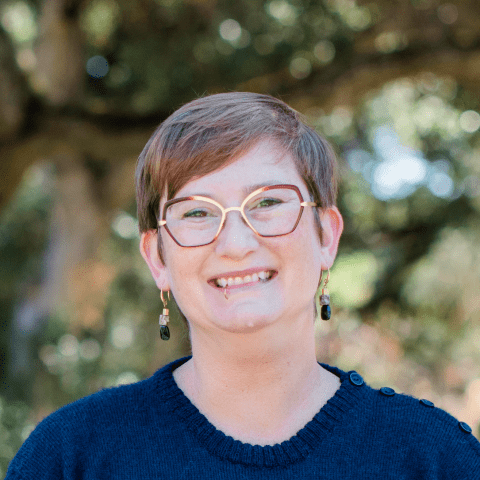 Dr. Michelle Hays Parasites and their hosts shape one another’s evolution. In addition, the environment in which host-parasite conflicts take place can impact who wins and how. Dr. Michelle Hays is interested in how hosts evolve to ‘fight back’ against parasites and the trade-offs associated with self-defense. Long-term, she is developing budding yeast as a model for host-parasite coevolution. While natural variation gives insight into what has evolved, experimental evolution allows empirical assessment of what can happen: directly testing theoretical models in the laboratory, and generating new understanding of the principles of adaptive evolution. Dr. Hays is an HHMI Hanna H. Gray Fellow and is currently a postdoctoral scholar at Stanford University working in Dr. Gavin Sherlock’s lab. Her scientific interests are rooted in her past training: as a research technician in Dr. Aimee Dudley’s lab she first became interested in how adaptation is a balance between genome stability and biological innovation. This led her to the University of Washington for her PhD in Molecular and Cellular Biology under the mentorship of Dr. Harmit Malik at the Fred Hutchinson Cancer Center. There she used natural variation to understand how some budding yeasts naturally evolved to restrict a parasitic plasmid. Understanding how genetic background and external environment shape the evolutionary paths and mechanisms available for cells in conflict to mount a defense has implications for understanding treatment of both infectious disease and cancers, where pathogens and malignant cells are adapting to both biotic and abiotic pressures.
Dr. Michelle Hays Parasites and their hosts shape one another’s evolution. In addition, the environment in which host-parasite conflicts take place can impact who wins and how. Dr. Michelle Hays is interested in how hosts evolve to ‘fight back’ against parasites and the trade-offs associated with self-defense. Long-term, she is developing budding yeast as a model for host-parasite coevolution. While natural variation gives insight into what has evolved, experimental evolution allows empirical assessment of what can happen: directly testing theoretical models in the laboratory, and generating new understanding of the principles of adaptive evolution. Dr. Hays is an HHMI Hanna H. Gray Fellow and is currently a postdoctoral scholar at Stanford University working in Dr. Gavin Sherlock’s lab. Her scientific interests are rooted in her past training: as a research technician in Dr. Aimee Dudley’s lab she first became interested in how adaptation is a balance between genome stability and biological innovation. This led her to the University of Washington for her PhD in Molecular and Cellular Biology under the mentorship of Dr. Harmit Malik at the Fred Hutchinson Cancer Center. There she used natural variation to understand how some budding yeasts naturally evolved to restrict a parasitic plasmid. Understanding how genetic background and external environment shape the evolutionary paths and mechanisms available for cells in conflict to mount a defense has implications for understanding treatment of both infectious disease and cancers, where pathogens and malignant cells are adapting to both biotic and abiotic pressures.
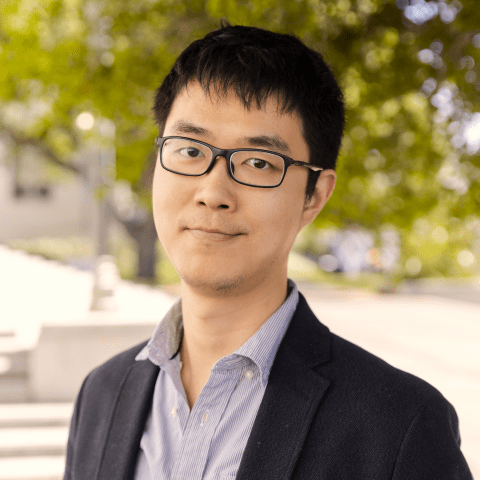 Dr. Chenshu Liu (pronounced Chen-Shoo Leu; pronoun: he/him/his) is a Life Sciences Research Foundation postdoctoral fellow working with Prof. Abby Dernburg at University of California, Berkeley. Chenshu received his B.S. from University of Science and Technology of China and his Ph.D. in Cell Biology from Vagelos College of Physicians and Surgeons at Columbia University. Chenshu is a cell biologist interested in how mechanical and chemical signals translate into reproductive success. Specifically, he investigates how mechanical forces are transmitted to and sensed by the nuclear envelope in cells undergoing meiosis and oogenesis, to ensure oocyte production is both accurate and robust. Chenshu’s long-term goal is to capitalize on the new techniques he developed to gain mechanistic understanding of oocyte quality control, and ultimately translate this knowledge into potential intervention to tackle reproductive aging. Through Chenshu’s experiences, he sees talents taking many forms, and that individuals with different identities face numerous challenges in a societal system that has been historically unjust. Chenshu firmly believes equitable access to science is key to inclusive excellence.
Dr. Chenshu Liu (pronounced Chen-Shoo Leu; pronoun: he/him/his) is a Life Sciences Research Foundation postdoctoral fellow working with Prof. Abby Dernburg at University of California, Berkeley. Chenshu received his B.S. from University of Science and Technology of China and his Ph.D. in Cell Biology from Vagelos College of Physicians and Surgeons at Columbia University. Chenshu is a cell biologist interested in how mechanical and chemical signals translate into reproductive success. Specifically, he investigates how mechanical forces are transmitted to and sensed by the nuclear envelope in cells undergoing meiosis and oogenesis, to ensure oocyte production is both accurate and robust. Chenshu’s long-term goal is to capitalize on the new techniques he developed to gain mechanistic understanding of oocyte quality control, and ultimately translate this knowledge into potential intervention to tackle reproductive aging. Through Chenshu’s experiences, he sees talents taking many forms, and that individuals with different identities face numerous challenges in a societal system that has been historically unjust. Chenshu firmly believes equitable access to science is key to inclusive excellence.
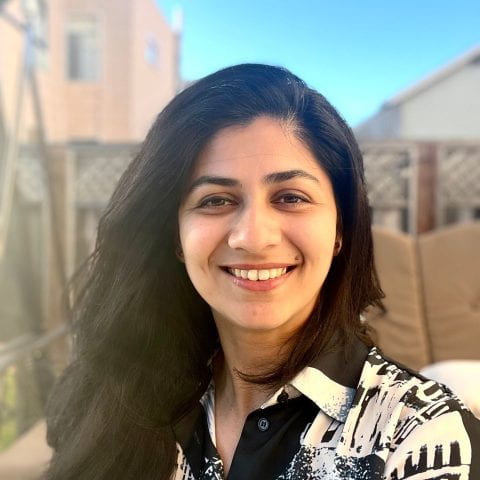 Dr. Smriti Sangwan is a postdoctoral fellow at UCSF in the labs of Prof. Peter Walter and Prof. David Agard supported by a K99 pathway to independence grant from NIGMS. She received her PhD from UCLA in the lab of Prof. David Eisenberg. Her research program focuses on the molecular mechanisms of ER quality control and its maladaptation under stress. Currently, she is working on IRE1 (Inositol Requiring Enzyme1) which acts as a gatekeeper of the endoplasmic reticulum (ER), the organelle where most transmembrane and secreted proteins fold. It senses the accumulation of unfolded proteins and activates a signaling network to correct the defect. Using single-particle cryoEM, next-generation sequencing and biochemical approaches, she has obtained a structural and functional understanding of IRE1’s role in co-translational protein quality control and its autoregulation (Sangwan et al. in preparation). Building on this discovery and merging it with her graduate experience in disease pathogenesis and structure-guided drug design, Dr. Sangwan will set up a lab focusing on understanding the principles of protein quality control at the ER with the long-term goal of leveraging the information for therapeutic design. The ER, translation machinery, and UPR sensors are hot spots for maladaptation in diseases and a targeted approach will yield therapeutic avenues in numerous diseases.
Dr. Smriti Sangwan is a postdoctoral fellow at UCSF in the labs of Prof. Peter Walter and Prof. David Agard supported by a K99 pathway to independence grant from NIGMS. She received her PhD from UCLA in the lab of Prof. David Eisenberg. Her research program focuses on the molecular mechanisms of ER quality control and its maladaptation under stress. Currently, she is working on IRE1 (Inositol Requiring Enzyme1) which acts as a gatekeeper of the endoplasmic reticulum (ER), the organelle where most transmembrane and secreted proteins fold. It senses the accumulation of unfolded proteins and activates a signaling network to correct the defect. Using single-particle cryoEM, next-generation sequencing and biochemical approaches, she has obtained a structural and functional understanding of IRE1’s role in co-translational protein quality control and its autoregulation (Sangwan et al. in preparation). Building on this discovery and merging it with her graduate experience in disease pathogenesis and structure-guided drug design, Dr. Sangwan will set up a lab focusing on understanding the principles of protein quality control at the ER with the long-term goal of leveraging the information for therapeutic design. The ER, translation machinery, and UPR sensors are hot spots for maladaptation in diseases and a targeted approach will yield therapeutic avenues in numerous diseases.
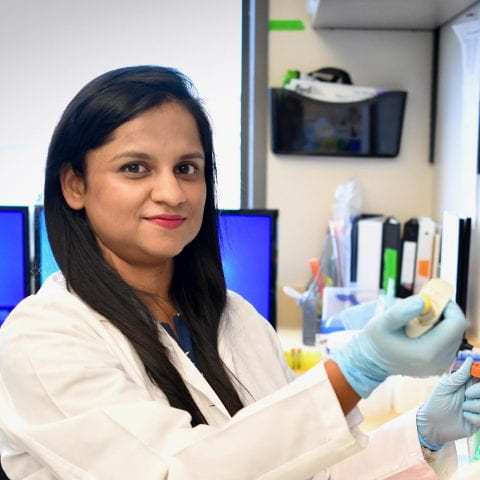 Dr. Debosmita Sardar holds a PhD in Medicinal Chemistry from Dr. Eric Schmidt’s Lab at the University of Utah. She is currently a postdoctoral associate in Dr. Benjamin Deneen’s Lab at Baylor College of Medicine. Her work, using glial cells in the mouse olfactory bulb, has shown how astrocytes utilize chemicals like serotonin to epigenetically modulate olfactory processing. Her research is supported by the NIH K99/R00 Pathway to Independence Award. She seeks to establish her own laboratory to investigate the mechanisms by which astrocyte epigenetics, triggered by sensory inputs of odors, contribute to genetically encode sense of smell. In the future, she aims to expand her research program to glial epigenetics associated with disease. Beyond her research, she is committed to mentoring and advancing inclusivity in research spaces. She has organized various programs to help postdoctoral researchers and encourage under-represented students to pursue careers in academia, including mentoring and teaching diverse college and high-school students.
Dr. Debosmita Sardar holds a PhD in Medicinal Chemistry from Dr. Eric Schmidt’s Lab at the University of Utah. She is currently a postdoctoral associate in Dr. Benjamin Deneen’s Lab at Baylor College of Medicine. Her work, using glial cells in the mouse olfactory bulb, has shown how astrocytes utilize chemicals like serotonin to epigenetically modulate olfactory processing. Her research is supported by the NIH K99/R00 Pathway to Independence Award. She seeks to establish her own laboratory to investigate the mechanisms by which astrocyte epigenetics, triggered by sensory inputs of odors, contribute to genetically encode sense of smell. In the future, she aims to expand her research program to glial epigenetics associated with disease. Beyond her research, she is committed to mentoring and advancing inclusivity in research spaces. She has organized various programs to help postdoctoral researchers and encourage under-represented students to pursue careers in academia, including mentoring and teaching diverse college and high-school students.

